#Irish War of Independence 1919-1921
Text
Episode 60 - the RIC, Auxiliaries, and Black and Tans During the Irish War of Independence
One of England’s main tools of colonization in Ireland was the police. Learn how England first police force was created in Ireland and why England switched to relying on paramilitary units instead of the local police during the Irish War of Independence.
Take part in the week-long global strike for Palestine
Join my Patreon
Follow me on Instagram and Tiktok
Continue reading Untitled

View On WordPress
#Auxiliaries#Black and Tans#IRA#Ireland#Irish Republican Army#Irish War of Independence 1919-1921#Royal Irish Constabulary
2 notes
·
View notes
Text
Cumann na mBan and the Irish Civil War
Despite the many challenges facing them, women were not passive observers of the Irish War of Independence or the Irish Civil War. Many women joined Cumann na mBan, a nationalist organization that worked closely with Sinn Fein and the IRA to achieve an independent Ireland. Cumann na mBan would be the first organization to reject the treaty and provide the anti-treaty side with its iron and…
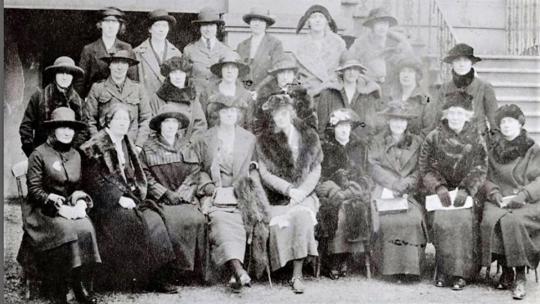
View On WordPress
#Constance Markievicz#Cumann na mBan#cumann na saoirse#IRA#Ireland#irish civil war#Irish Republican Army#Irish War of Independence 1919-1921#Irish women#Mary MacSwiney
1 note
·
View note
Photo
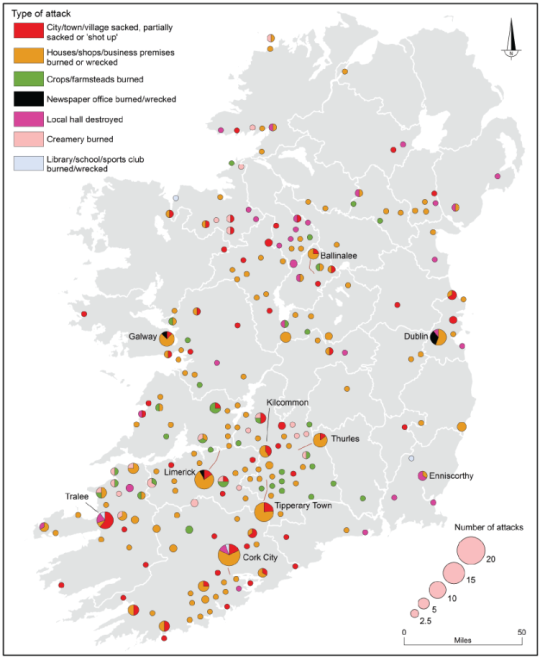
Reprisals against civilian targets carried out by British forces during the Irish War of Independence, 1919-1921.
127 notes
·
View notes
Text
Loves Revolution
Chapter 1
Pairing: Bradley Bradshaw (as Micheal Collins) x Jake Seresin (as Harry Boland) x OC! Madison Cassidy
Word count: 3.2K
A/n: This is the first post to my new series so please be nice! I'm going to try to make this into a series so please show this story a bit of love and reblog!
Summary: Bradley, Jake and Maddie have been friends for many years ongoing. Bradley from Cork and Jake and Madison from the troubled Dublin, have been close for life. Now fighting in the 1916 Easter rising and the ongoing history to the Treaty and the independence of Ireland their story lives on...
History: Bradley (represents) :Michael Collins (October 16, 1890 – August 22, 1922) was an Irish revolutionary, soldier, and politician who was a key role in the early twentieth-century campaign for Irish independence. During the Irish Civil War, he served as Director of Intelligence for the Irish Republican Army (IRA) and as a government minister in the self-proclaimed Irish Republic. From January 1922, he was Chairman of the Provisional Government of the Irish Free State, and from July till his death in an ambush in August 1922, he was Commander-in-Chief of the National Army.
Jake (represents) :Harry Boland (April 27, 1887 – August 1, 1922) was an Irish republican politician who led the Irish Republican Brotherhood from 1919 to 1920. From 1918 until 1922, he was a Teachta Dála (TD).He was elected as the MP for Roscommon South in the 1918 general election, but, like other Sinn Féin candidates, he did not serve in the British House of Commons, instead sitting as a TD in the First Dáil. Boland was elected to the second Dáil as a TD for Mayo South-Roscommon South in the 1921 general election. He was re-elected as an anti-Treaty candidate in 1922, but he perished two months later during the Irish Civil War.
History :The Easter Rising (Irish: Éir Amach na Cásca), often known as the Easter Rebellion, was an armed insurgency in Ireland in April 1916 during Easter Week. While the United Kingdom was waging the First World War, Irish republicans started the Rising against British control in Ireland with the goal of establishing an independent Irish Republic. It was Ireland's greatest important insurrection since the 1798 rebellion and the first armed battle of the Irish revolutionary period. Beginning in May 1916, sixteen of the Rising's leaders were executed. The executions' nature, as well as following political developments, eventually contributed to an upsurge in popular support for Irish independence.
Warning: Mentions of gun use, ptsd, mentions of death, mentions of shooting, flirting, mentions of abuse, description of dead body, death, blood
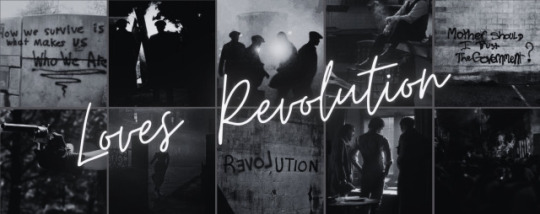
Year 1916, Easter
"Sir, we got the General Post Office surrounded, Sir! We believe that inside are De Valera, Macdonagh, Clark, Connolly and a lot of other rebellions, sir!" One of the funny dressed British soldiers replies to their head commander, with hand at forehead, ready for a salute. This is how the English planned it all along, for the most important rebellions to be stuck at one place, surrounded with no escape.
"So we have the G.P.O, good, very good, but what about O'Connells street, Stevens green, The Liffey and the four courts?" The head commander asked the young man who still held his hand above his head, not moving an inch. "The areas are empty, sir! Either captured or escaped but the rest are at the G.P.O, sir!"
They're all where they were supposed to be, all in one place, no room to escape and they'll give in to this nonsense, they had no way to continue fighting against the British or loyal Irish. The undertakers or loyal Irish were against the rebellions, fighting against them at this very moment, all they had to do now is give themselves up to the English.
"Are there any women inside, lieutenant?" Any innocent woman that had been stuck inside the G.P.O that had been inside the building for the past five days, did not deserve the faith they may face in several minutes from now. The soldiers aligned outside of the building will not hesitate to kill anyone on the inside but the women didn't deserve it.
"There's women of aid and very little volunteers, sir! We believe that one of the fellow female friends of De Valera's help is inside the building. Her parents put her off name Madison Cassidy, but to the public she's known as 'Maddie', sir!" A woman so apparently known to the public but how? No woman that the commander has heard of went by that name or was 'known to the public', no woman has ever had the might or power to be so known in the streets of Dublin or the county of Leinster. "What do you mean 'known to the public', lieutenant?" "She's a public speaker, sir!"
A female public speaker? And that was apparently known to people. Absurd. An absolute absurdity. Some young girl, that he has never heard of decided to become a public speaker. What a joke! She should be scrubbing the dishes, washing the linen, taking care of the kids or cooking and not wasting her time over public speeches. And who would even listen to her? Some sort of female, trying to put her thought into a speech that is apparently supposed to motivate people to do something.
And she believes that's gonna work, but like the lieutenant mentioned, she did work with De Valera. "Bring her to me, nobody lay a finger upon her, understood?" "Yes sir!"
---------------
The gun shots echoed in your ears. It was a sensation as if your ears were violently and rapidly ringing, due to the awful noises that have been haunting your brain for the past five days. You've been in the G.P.O for so long and at this point, it felt like you haven't left in centuries.
You're hiding behind a big, destructed pillar at the moment, leaning your back against it, catching your breath. There was no way out, there was English all around the grand building and mostly everything inside was burning and what didn't make it better is the roof, it's too weak to hold more racket. Even if the English didn't manage to get you guys out, the roof looked like it was only gonna last two more days before swallowing all of you.
"Maddie!" Bradley's voice, called out as the rebel has been looking for you. Him and Jake have been shooting from further up front of the building and now you were unsure if to answer. You couldn't fight more, even though it was written in your blood to fight for the right of being an independent country. But now Leinster, Munster, Connaught and Ulster should forgive you but you've had enough.
"I'm here!" You call out from behind the pillar, Bradley immediately runs over to you, diving behind the pillar like you did as a shelter from not getting shot.
"We're giving up," he told you, those baby cow eyes never dropping your gaze, not even for a second. "What?" You couldn't believe it. You guys destroyed Dublin. The streets of your hometown were in ruins from this rebellion, just so you could give up. That was bloody nonsense.
"They got us surrounded, we have no choice but to give in." "Bradle-" He cut you off, he knew you'd argue or do some sort of disagreement but there was no other way. "I know Maddie, but we had a meeting upstairs and there's nothing we can do they have the four courts and Stevens green and the rest. We have to make it out alive and this is not a step towards that."
You look over the pillar to see men on your side fighting, tired wrecked and most likely depressed. They're not going to make it out alive if we don't give up but if we do they'll probably be shot, either way.
"BRADSHAW!" De Valera calls out, with his old, crispy sharp voice. Sounds like a snob but is the chief, the man everyone listens to and who is leading your group forward. He had to go, you wonder how or when they're going to give up but he lays a soft, delicate, quick kiss on your cheek and gets up and runs towards Jake to help. Jake looks like he had enough.
The building's broken architecture, dust has covered his body and he looks wrecked. He looked over at Bradley running and quickly yanked him behind to a standing pillar up front of the G.P.O. The military has brought in machine guns, full loads and everyone crouches down with full might trying not to get shot. You all were going to die, you knew it. Either shot now or shot later is how you're all going to end, just each had to decide what's best for themselves.
For a full ten minutes of nonstop shooting, the military guns stopped, waiting for a reaction out of the rebellion group. They were going to give up now, you knew it. Dev and the rest ran over to a soldier and wrapped a white flag around his shotgun and told him to head up front.
This is the sign of the rebellions giving up. This was the sign to signify that you guys had enough. One by one they leave the building and you get up from behind the fallen pillar and run to the exit. The second you reach behind De Valera, Bradshaw and Seresin you could tell they were going to give up and this was the end for them.
You stand behind them as the English General calls out orders, "FOUR STEPS FORWARD!" You all do as told. "DROP YOUR WEAPONS!" Anyone who held a gun or anything of that sort does as they're told. "NOW, TWO STEPS BACK!" And that was the last order till the round up.
---------------
An English General was calling out English rebellion names, one by one, dragging them out of the crowd by his ugly cane. "McDonagh. Thomas Clark." Both were dragged out of the crowd by the bloody officer. Each name was dragged out in his tongue and then the actionist was dragged out of the group, except one injured man, Connolly, who was lying down due to a leg wound and instead he was just kicked and carried away on the cloth stretcher.
"Get up, you Fenian swine. Now who else am I missing?" The general murmurs are loud enough for you to hear. He looks up and down the crowd and lays his gaze upon you. "Cassidy!" He calls out your second name and dragged you with his cane forward. Beside you stood the rest of your friends just like before and called out one more name before leaving. "De Valera!"
At that Bradley grunted and pulled a bit forward but Jake got a grip of him and pulled him back. "Brad, if we wanna make out of this shit hole alive, I'm sorry to say but we can't do anything about this," Jake says as he watches the officers drag you and Dev away. And murmurs lowly below his breath, "We can't do anything now."
---------------
They dragged you out of your cell. Death by the firing squad, you can see it so clearly now. Your own fellow friends, the 'Loyal Irish' are about to shoot you and cost you your life in just minutes.
As they drag you through the halls that are dim with no light, you expect happy memories to come but your mind stays dark and blank. You were dragged up as far as the outside where on the floor all you saw was blood from the last corpse that was shot and too heavy and invaluable to carry so just dragged like a worthless shit.
You were lined up against the wooden wall and you looked over to the soldier that was supposed to put a bag over your head but instead said, "Pray." That simple four letter word was a suggestion, a way that god would forgive you but the soldiers were gonna be pissed off more because you were catholic not some prodestant like the English tried, but you still say your prayers as a command. You do the sign of the holy cross and pray.
"I confess to almighty God and to you my brothers and sisters, that I have greatly sinned, in my thoughts and in my words, in what I have done and in what I have failed to do.
Through my fault, through my fault, through my most grievous fault; therefore I ask blessed Mary ever- Virgin, all the Angels and Saints, and you, my brothers and sisters, to pray for me to the Lord our God.
Amen."
And at that the same male officer who just two minutes back, barked at you to pray, gets handed a sack. The sack that was about to be thrown over your head, before one of the fellow Irish citizens on behalf of the English shoots you.
You wanted to scream but nobody would listen. You wanted to run but you wouldn't get far. You wanted to tell Jake and Bradley that you cared about them. You wanted Dublin and all of Ireland to be free again. At that thought the sack was thrown over your head and the big bang of the guns stopped your thinking for all….
----------------
'The fact that l was born in America might save my hide. Either way, I am ready for what comes. The Irish Republic is a dream no longer. It is daily sealed by the lifeblood of those who proclaimed it. And every one of us they shoot brings more people to our side.They cannot imprison us forever. And from the day of our release, Bradley, we must act as if the Republic is a fact. We defeat the British Empire by ignoring it. Now I hear the payers of our beloved friends, Macdonagh, Clark, Cassidy, each of them ended their last speech with Amen and to us that will stand for peace, yet so we shall still try to make it our peace and remember the men and woman in a way that no one ever has.'
That was the first and last letter from Dev and the way that your second name stood out to Bradley was significant. He loved the way you cringed when he said your full name and you crinkled your nose, which caused him to laugh uncontreablly, but now that's all gone.
"She's dead, Jake, they shot her," Bradley, tries not to break apart on the prison steps as he lets those words leave his mouth. The young woman that he admired, fought with was now easily put six feet underground due to a bullet. Such a short, beautiful life of a lady, wasted due to a firing squad.
"She died like she wished, Brad, she wanted to fight for her country and die trying," Jake lets out as he can't stop thinking about you just standing there, waiting for the bullet to pierce your skin. He wanted to cry, scream but he couldn't, not here or now. Bradley was the same he wanted to choke the next guard he saw because there's a chance that it was their bullet that hit you.
"She didn't deserve it, Jake. Not her. She fought but we dragged her into this." "We may have involved her into this, but nobody deserves this faith, Brad. Absolutely nobody."
Year 1918, May
"They let us out of jail so we can do our best to be put inside again," Bradley smirked as the two got of the train that has brought them out of prison sights into town. Shirt drive but freedom for the first time in two years. Final peace with no officers at your back or stupid cells and jail uniforms.
"Don't you see a certain paradox in that?" Jake looked over at his companion in a short shock and repeated. "Paradox." At that Bradley crumbles the piece of paper that he was reading and states like some dictionary. "A contradiction. An immovable force meets an immovable object kind of thing."
The two of them continue walking forward and see a young bride and groom saying their goodbyes to their family as the town was too small for them and they wished to see the world, explore. It brought sadness in both of the men's hearts thinking both about the lovely lady in their past. And sadly the main word of that sentence was past, because whatever hopes they had for her were over now.
"Look, isn't that a lovely picture?" It truly was. It's the kind of picture everyone wishes for and desires at heart. "Maybe we should settle down." Probably a smart thing. To find love in this hopeless place may have made it easier the get through in life and focus on the main goals in a different perspective. In a love kind of way. "Just the two of us?" The other friend joked causing the two to laugh.
"And him." Says Bradley while Jake looks to him in pure confusion. "Who?" Jake had no clue who his fellow friend was referring to and you could easily tell that by the expression on Jake's face. Bradley simply points at the car with two men standing outside. Tom and Sean the men they've fought the Easter Rising with. The two, were friends with Jake and Bradley and somehow we're still not chickened out to help them.
"How are you?" Bradley asks giving Tom a hug as the two have not seen each other since the line up. Tom smiles up at him, since he falls rather short in height and pats Bradley shoulders. "Well, as best as a rebel can be." With those words leaving his mouth, Tom turns to Jake giving him an equal hug as Sean quickly hugs Bradley. "Get in you two, we got a show to attend!"
"How did they know we we're here already?" Bradley wonders looking over his shoulder to find two of the loyal Irish that have been following him and Jake even since the two of them have left jail and entered the not so free freedom. They were gonna get chased down on every step they make every. Any plan will be tracked and this is not what freedom is supposed to be about.
"They know what we eat for breakfast Bradley. This is the bare minimum of their poxy power," answered Sean while driving on a country side road, filled with branches everywhere and no actual pathways for pedestrians. It was a quite Irish road; nothing close to being straight, it was filled by potholes and indents and it wouldn't even be defined as a road, it was just a bunch of loose gravel.
"Well there's only one answer to that. We find out what they eat for breakfast!" Bradley exclaims as Jake looked at his friend in pure confusion and a bit of terror. The terror of how had he managed to survive with the lad for so long. The two years in prison together and many years of friendship before that. People would call him mad if they seen that he survived that long with the crazy brunette. "You're a mad fucker, Bradley," Jake said shaking his head side to side.
"Yeah, but I'm the mad fuck you hang out with," said the brunette, laying his baby cow eyes upon his friends, spring green ones. The two of them are close. They've always been that way but some bond that they have will never be broken. No such thing on this world can interrupt their friendship.
"So are the two of you looking for anyone out the old leading squad?" Asked Sean, with a hint of suspense in his voice. Was there really anyone from the old leading squad left that wasn't shot, hung or killed in any kind of way. Bradley looked over his shoulder to see that the loyal Irish were still behind them, hunting them down like hawks for their pray, right on their heals, step by step behind them. "Well, who can we look for? Either shot or some other cruel way of getting put down into the poxy earth!" Said Jake as he was sitting down, in a kind of slouch, hand behind his head, leaning back with his old fashion cap over his eyes to block out the Irish sun that was barely ever showing at times.
"Ah, Maddie made a big fit out of it a whole while back. Pissed her off, it did! Several speeches and annoying the British that they bloody had to have a full law talk with her but she won!"
Maddie? As in their Maddie? Madison Cassidy? The woman that the two grew up with and who sadly lost her life to the firing squad in 1916? That can't be right. She gott shot, just like the rest. Full prayer ending and mad shit like tha'. This didn't make sense. It didn't add up. "As in our Maddie?" Exclaimed Bradley, thinking he's mistaken, he saw his dear friend get dragged out the line up and heard about her shooting. "Yeah. Don't you guys know Maddie? Madison Cassidy? She worked with De Valera, yeah she still does all the speech things." Answered Tom , expecting the two men to have met the young, independent, confident woman.
This shook the two men inside. They've heard and believed for the last two years the woman that the two of them shared interest for had died, cruelly, due to the firing squad. "We thought she died!" Jake said, he's still shocked. Once he heard that she is alive, he quickly sat up from his slouched position, rubbed his hands down his face and fixed his flat hat. "Nah, they wouldn't manage to put her down that easily!"
"We heard she got shot by the firing squad after the G.P.O!" This is what they have believed and hearing the news that she's been alive the whole time doesn't quite add up to the two men. "Nah, she's alive mate!"
Current taglist:
@callsign-magnolia
@shanimallina87
@callsign-dexter
@rosiahills22
@horseslovers2016
@djs8891
@hookslove1592
@emma8895eb
@hardballoonlove
@kmc1989
@dempy
@mamachasesmayhem
@senawashere
@emma8895eb
@buckysteveloki-me
@sweetwhispersofchaos
@a-beaverhausen
#jake seresin#hangman x reader#hangman top gun#top gun hangman#jake hangman seresin#jake seresin imagine#jake seresin x reader#jake seresin x you#jake seresin x y/n#jake hangman fic#jake hangman x reader#jake hangman x you#jake hangman imagine#hangman imagine#hangman fanfiction#hangman seresin#bradley rooster bradshaw#bradley bradshaw x reader#bradley rooster x reader#bradley rooster x y/n#rooster x reader#rooster x you#rooster top gun#rooster bradshaw#top gun smut
29 notes
·
View notes
Text
#OTD in 1980 – Death of Tom Barry, he died in a Cork hosptial and was survived by his wife, Leslie de Barra (née Price).
General Thomas (Tom) Barry was one of the most prominent guerrilla leaders in the Irish Republican Army during the Irish War of Independence.
In 1920, Barry joined the 3rd (West) Cork Brigade of the Irish Republican Army (IRA) which was then engaged in the Irish War of Independence (1919–1921). He was involved in brigade council meetings, was brigade-training officer, flying column commander,…

View On WordPress
#Cork#History#History of Ireland#IRA#Ireland#Irish Civil War#Irish History#Irish War of Independence#Today in Irish History#Tom Barry
9 notes
·
View notes
Text
Hetalia Character Profiles - Ireland

Character’s Name: Ireland. Shannon Orla Doyle (1175-1949), Shannon Orla Doyle-Kohler (1949-present), Shaz (by Mhairi and Mathias), Mum (by Liam).
Age: Human - Baby, toddler, and child (400s-1175), teenager (1175-1542), Appears 18 by 1542, is 27 in the modern day.
Height: 5”5 (165cm).
Physical Description: Average height, Shannon is the shortest of her siblings, with Mhairi (Scotland) only being slightly taller and Dylan (Wales) and Arthur (England) being a couple of inches taller. Shannon has a slim hourglass build.
Eye Colour: Emerald green.
Hair Colour/Style: Long strawberry blonde curls that reach down to her waist. Shannon has thick hair like Mhairi. Shannon usually has her hair tied up in braids or buns.
Other Physical Traits: Freckles all over her face and body. Shannon also has her ears pierced and a Celtic tattoo on her back.
Personal Appearance/Style: Shannon wears a lot of greens, blues, browns, reds, and white. Shannon’s wardrobe is full of dresses, long skirts, comfy jumpers, and blue jeans.
Verbal Style: Shannon speaks with a broad Irish accent. Shannon also speaks Irish as well as English.
Education: Shannon is well-educated and helped Mhairi teach Alfred (America), Matthew (Canada), Jake (Australia), and Rachel (New Zealand). Later, Shannon taught Liam (Northern Ireland). Shannon has a degree in nursing that she earned in the 1920s.
Occupation: Diplomat. Shannon also works as a nurse in her spare time.
Past Occupations: Military nurse and as a midwife for Mhairi.
Skills, Abilities or Talents: Shannon is a talented dancer and enjoys traditional Irish dance. Shannon is also a talented musician and can play the fiddle and the harp as well as sing. Shannon enjoys baking and often bakes cakes and cupcakes.
Positive Personality Treats: Friendly, motherly, compassionate, and outdoorsy.
Negative Personality Traits: Stubborn and can be hot-headed.
Sense of Humour: Sarcastic and dark.
Physical/Mental Illnesses or Afflictions: Shannon has traumas that stem from Arthur invading Shannon, as well as the religious wars in Ireland that would lead to the Troubles. In 1921, after gaining Independence from the UK, Shannon found herself separated from her only child, Liam, which devastated Shannon.
Hobbies/Interests: Dancing, painting, playing the harp, playing the fiddle, and singing.
Favourite Foods: Stew, fish, and shephards pie.
Most Important Personal Items: Her emerald engagement, her photo albums, and her collections of Irish literature.
Person/Friend Close to Character: Shannon’s younger sister and best friend, Mhairi. Shannon and Mhairi are the closest siblings of the British Isles and often spend time together, usually hiking. Mhairi tries to visit Shannon at least once a month, and Shannon will also try to visit Mhairi. The sisters share a lot of history together, and they can both speak Irish and Scottish Gaelic, as the languages are similar. The two were Suffragettes in the 1900s and 1910s, along with Rachel, and all three often went to protests around the UK.
Background: Shannon was born around the 400s AD to Hibernia and Britannia. Shannon is the eldest of four siblings. Shannon is closest to her younger sister Mhairi, but is close to her younger brother, Dylan. Shannon doesn't have the best relationship with Arthur after the way that he’s treated Shannon since the 1100s. After becoming a republic in 1949, Shannon married her long-term boyfriend, Mathias (Denmark), with Mhairi and Lukas (Norway) as the two witnesses. In 1919, Shannon gave birth to Liam, with Mhairi as her midwife.
2 notes
·
View notes
Note
“Many European monarchs were kicked out because they didn't listen to the people.”
European monarchies & Principalities:
Uk 🇬🇧 Denmark 🇩🇰 Sweden 🇸🇪 Holland 🇳🇱 Spain 🇪🇸 Netherlands 🇳🇱 Belgium 🇧🇪 Monaco 🇲🇨 Lichtenstein, Luxembourg & Andorra
Not counting previously soviet states with their complex history & the Baltics.
Republics are:
Germany, France, Italy, Austria, Ireland, Finland, Greece & Poland Cyprus.
Malta was the last monarchy tp become a republic in 1974. That’s nearly 50 years ago.
Reasons for republicanism vary but most are linked to Europe after WW1, apparently.
So nothing as straightforward as not listening to the populace.
Hi Nonny,
Yes, the reasons for a country deciding to become a republic are complex and usually related to both their past history and the politics of the time. They have occurred all through history, with France I think being the oldest (1789 and afterwards). Some of the other countries were a result of WW1 and others, like Ireland, decided the time was right to win freedom from their detested rulers for various reasons (the Irish War of Independence, 1919-1921). It is a very complex subject and like you said, I don't think it can be reduced to a single cause.
17 notes
·
View notes
Text
Events 3.19 (before 1960)
1277 – The Byzantine–Venetian treaty of 1277 is concluded, stipulating a two-year truce and renewing Venetian commercial privileges in the Byzantine Empire.
1279 – A Mongol victory at the Battle of Yamen ends the Song dynasty in China.
1284 – The Statute of Rhuddlan incorporates the Principality of Wales into England.
1452 – Frederick III of Habsburg is the last Holy Roman Emperor crowned by medieval tradition in Rome by Pope Nicholas V.
1563 – The Edict of Amboise is signed, ending the first phase of the French Wars of Religion and granting certain freedoms to the Huguenots.
1649 – The House of Commons of England passes an act abolishing the House of Lords, declaring it "useless and dangerous to the people of England".
1687 – Explorer Robert Cavelier de La Salle, searching for the mouth of the Mississippi River, is murdered by his own men.
1808 – Charles IV, king of Spain, abdicates after riots and a popular revolt at the winter palace Aranjuez. His son, Ferdinand VII, takes the throne.
1812 – The Cortes of Cádiz promulgates the Spanish Constitution of 1812.
1824 – American explorer Benjamin Morrell departed Antarctica after a voyage later plagued by claims of fraud.
1831 – First documented bank heist in U.S. history, when burglars stole $245,000 (1831 values) from the City Bank (now Citibank) on Wall Street. Most of the money was recovered.
1853 – The Taiping Heavenly Kingdom occupies and makes Nanjing its capital until 1864.
1861 – The First Taranaki War ends in New Zealand.
1863 – The SS Georgiana, said to have been the most powerful Confederate cruiser, is destroyed on her maiden voyage with a cargo of munitions, medicines, and merchandise then valued at over $1,000,000.
1865 – American Civil War: The Battle of Bentonville begins. By the end of the battle two days later, Confederate forces had retreated from Four Oaks, North Carolina.
1885 – Louis Riel declares a provisional government in Saskatchewan, beginning the North-West Rebellion.
1895 – Auguste and Louis Lumière record their first footage using their newly patented cinematograph.
1900 – The British archeologist Sir Arthur John Evans begins excavating Knossos Palace, the center of Cretan civilization.
1918 – The US Congress establishes time zones and approves daylight saving time.
1920 – The United States Senate rejects the Treaty of Versailles for the second time (the first time was on November 19, 1919).
1921 – Irish War of Independence: One of the biggest engagements of the war takes place at Crossbarry, County Cork. About 100 Irish Republican Army (IRA) volunteers escape an attempt by over 1,300 British forces to encircle them.
1931 – Governor Fred B. Balzar signs a bill legalizing gambling in Nevada.
1932 – The Sydney Harbour Bridge is opened.
1943 – Frank Nitti, the Chicago Outfit Boss after Al Capone, commits suicide at the Chicago Central Railyard.
1944 – World War II: The German army occupies Hungary.
1945 – World War II: Off the coast of Japan, a dive bomber hits the aircraft carrier USS Franklin, killing 724 of her crew. Badly damaged, the ship is able to return to the US under her own power.
1945 – World War II: Adolf Hitler issues his "Nero Decree" ordering all industries, military installations, shops, transportation facilities, and communications facilities in Germany to be destroyed.
1946 – French Guiana, Guadeloupe, Martinique, and Réunion become overseas départements of France.
1958 – The Monarch Underwear Company fire leaves 24 dead and 15 injured.
0 notes
Text
Books of 2023
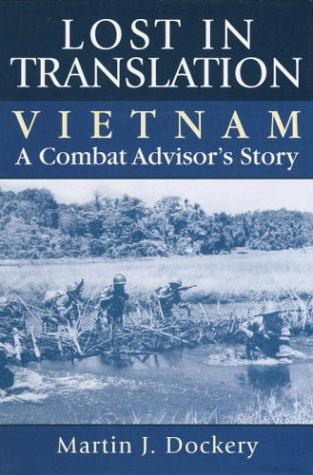
Book 34 of 2023
Title: Lost in Translation: Vietnam: A Combat Advisor's Story
Authors: Martin Dockery
ISBN: 9780891418085
Tags: Buddhism (Religion), Catholic, CHE Geneva Conference of 1954 (French Indochina War), CHE Switzerland, CHN China, CHN Hong Kong, CHN MSAR Macao Special Administrative Region, FRA France, GER Germany, GER Germany - Oberammergau, HKG Hong Kong, Interrogator, IRL Ireland, IRL Irish War for Independence (1919-1921), IRL President Eamon de Valera, KHM Angkor Temples, KHM Cambodia, PHL Baguio, PHL Camp John Hay, PHL Hukbalahap, PHL Manila, PHL Philippines, PHL US USAF Clark Air Force Base, US AIR Airlift International Airlines, US President John F. Kennedy, US President John F. Kennedy Assassination - Dallas TX (1963), US Secretary of Defense Robert McNamara, US USA 3rd Infantry Regiment - 1/3, US USA 3rd Infantry Regiment - 1/3 - B Co, US USA 3rd Infantry Regiment - The Old Guard, US USA Camp A P Hill VA, US USA Fort Benning GA, US USA Fort Bragg NC, US USA Fort Knox KY, US USA General Paul D. Harkins, US USA United States Army, US USN LCM-8 Mike Boat, US USN United States Navy, USN USS Iwo Jima (LPH-1), VNM 1968 Tet Offensive (1968) (Vietnam War), VNM AN Nhon Tay, VNM Assassination of Ngo Dinh Diem (1963) (Vietnam War), VNM Ba Chieu, VNM Bac Lieu, VNM Battle of Ap Bac (1963) (Vietnam War), VNM Battle of Dien Bien Phu (1954) (French Indochina War), VNM Ben Hai River, VNM Can Tho, VNM Cao Dai Religion, VNM Chau Doc, VNM Cholon, VNM Cholon - Truc St, VNM DMZ Demilitarized Zone - 17th Parallel (Vietnam War), VNM DRV Ho Chi Minh, VNM DRV NVA North Vietnamese Army, VNM DRV VC Viet Cong, VNM DRV VM Viet Minh, VNM French Indochina War (1946-1954), VNM Go Noi, VNM Ha Tien, VNM Ho Chi Minh Trail (Vietnam War), VNM Hoa Hao Religion, VNM IV Corps (Vietnam War), VNM Kien-Giang Province, VNM Long Xuyen, VNM Mekong Delta, VNM Mekong River, VNM Montagnards, VNM My Tho, VNM Rach Gia, VNM RVN ARVN 21st ID, VNM RVN ARVN 33rd Regiment, VNM RVN ARVN 33rd Regiment - 2/33, VNM RVN ARVN 7th ID, VNM RVN ARVN Army of the Republic of Vietnam, VNM RVN ARVN IV Corps, VNM RVN Chieu Hoi Program/Force 66 - Luc Luong 66 (Vietnam War), VNM RVN Kit Carson Scouts (Vietnam War), VNM RVN Madame Nhu (Tran Le Xuan), VNM RVN Ngo Dinh Diem, VNM RVN Ngo Dinh Nhu, VNM RVN Ngo Dinh Thuc, VNM RVN RVNP Can Sat National Police, VNM RVN VNN Republic of Vietnam Navy, VNM RVN VNN River Patrol Force, VNM RVN VNN RPF RAG River Assault Group, VNM RVNP CSDB Can Sat Dac Biet Special Branch Police, VNM Saigon, VNM Saigon - Caravelle Hotel, VNM Saigon - Cercle Sportif Saigonnais, VNM Saigon - Mai Lan Hotel, VNM Saigon - Rex Hotel, VNM Soc Trang, VNM South Vietnamese Coup (1963) (Vietnam War), VNM Tan Son Nhut Air Base, VNM US Advisory Group (Vietnam War), VNM US MACV Advisory Teams (Vietnam War), VNM US MACV IV Corps Advisory Team (Vietnam War), VNM US MACV Military Assistance Command Vietnam (Vietnam War), VNM Vietnam, VNM Vietnam War (1955-1975)
Rating: ★★★ (3 Stars)
Subject: Books.Military.20th-21st Century.Asia.Vietnam War.ARVN, Books.Military.20th-21st Century.Asia.Vietnam War.US Army.Advisor
Description: In September 1962, when Martin Dockery landed in Saigon, he was a young, determined, idealistic U.S. Army first lieutenant convinced of America’s imminent victory in Vietnam. While most of the twelve thousand U.S. military advisors in-country at the time filled support positions in Saigon and other major cities, Dockery was one of a handful of advisors assigned to Army of the Republic of Vietnam (ARVN) combat units. For eight months Dockery lived and fought in the heart of the Mekong Delta with an ARVN infantry battalion on missions and operations that often lasted several days. And for most of that time, whether tramping through the steaming, leech-infested jungle, hiking across canals, or engaging in sudden firefights, Dockery was the only American soldier with the unit. Dockery’s solitary assignment with ARVN during the infancy of U.S. involvement in Southeast Asia afforded him an understanding of Vietnam far more profound than most other Americans. Lost in Translation is his riveting account of the largely overlooked role of American combat advisors in the war. As he vividly evokes the sounds, smells, and vistas of the country and its people, Dockery depicts an army poorly trained, incompetent, and unwilling to fight for a government every bit as corrupt as that of the French colonial empire it replaced. Yet even worse than his daily fare of isolation, frustration, and danger was Dockery’s growing conviction that the advisory program was doomed. Though these dedicated, highly motivated advisors would do their best and persevere under the most trying circumstances, they would not succeed. The author’s eyewitness testimony provides inescapable evidence that as early as 1962 the writing was already on the wall concerning the outcome of the Vietnam War. Although it would take U.S. leaders more than a decade to divine what the young officer learned in a single year, Dockery’s personal and penetrating analysis of the war—which he presented in a lecture at a Special Forces facility in Germany one week after his tour in Vietnam ended—proved chillingly accurate. Those who send soldiers to war should consider the realities and truths within these pages.
#Books#Ebooks#Booklr#Bookblr#military history#history#vietnam war#vietnam#arvn#us army#advisor#non fiction
1 note
·
View note
Note
What did England do to Ireland?
Oh boy, it's more like what they didn't do anon. Sit back as you'll be reading for a while.
From the late 12th century, the Anglo-Norman invasion of Ireland resulted in Anglo-Norman control of much of Ireland, over which the kings of England then claimed sovereignty. By the late Late Middle Ages, Anglo-Norman control was limited to an area around Dublin known as the Pale.
Enacted in 1494, Poynings law ensured that the Irish parliament could not meet without the approval of England's monarch and Privy Council. In 1541, English king Henry VIII changed Ireland's status from a lordship to a kingdom, and he was proclaimed King of Ireland.
The United Irishmen Rebellion of 1798 (which sought to end British rule in Ireland) failed, and the 1800 Act of Union merged the Kingdom of Ireland into a combined United Kingdom of Great Britain and Ireland.
In the mid-19th century, the Great Famine (1845-1851) resulted in the death or emigration of over two million people. At the time, trade agreements were controlled by the British government and whilst millions were suffering from hunger, Irish harvests of wheat and dairy products were exported to Britain and other overseas territories.
A Home Rule Bill was passed in 1912 but not brought into law due to the outbreak of World War I in 1914. The Easter Rising of 1916 resulted in the execution of the rebellion's leaders. In the 1918 Irish general election, Sinn Féin won a majority of Irish seats and in 1919 these elected MPs declared the independence of the Irish Republic. The Irish War of Independence followed from 1919 to 1921. The Government of Ireland Act of 1920 and the Anglo-Irish Treaty of 1921 resulted in the formation of the Irish Free State, while Northern Ireland's MPs opted out to form Northern Ireland.
And this is just some of it
0 notes
Text
Downton Abbey Timeline Explained: Every Season & Movie
As we await Downton Abbey movie 2 (currently filming), here’s the “Downton Abbey Timeline Explained: Every Season & Movie” from 1912 to 1927 from ScreenRant.
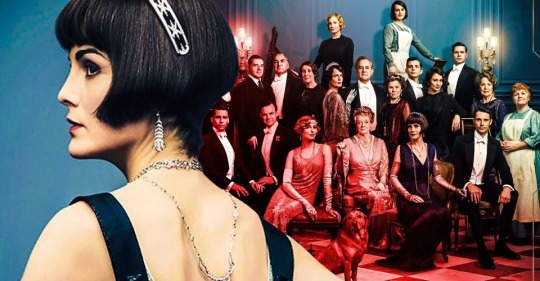
The Downton Abbey timeline spans six seasons and a movie, covering about 15 years in a time of upheaval and change in the history of England.
Downton Abbey follows the lives of the Crawley family and their staff over the course of several years, from 1912 to 1927. In England, these years were a time of rapid changes in social structures, with the rise of the working class and decline of the aristocracy, and of significant historical events, most importantly The Great War. Over the course of six seasons and a feature film, the series entwines the fictional characters' stories with the true historical events going on around them both in the UK and the wider world.
The show, created by Julian Fellowes, first premiered in the fall of 2010 and quickly saw success across the UK, US, and internationally. Downton Abbey jump started the careers of many now well known cast members. Audiences were introduced to the aristocratic Crawley family including Hugh Bonneville as the Earl of Grantham, Elizabeth McGovern as his wife the Countess of Grantham, and their three daughters Lady Mary (Michelle Dockery), Lady Edith (Laura Carmichael), and Lady Sybil (Jessica Brown Findlay). Maggie Smith plays the imposing Dowager Countess of Grantham, and Penelope Wilton embodies Isobel Crawley, her match in wit and willpower. Among the staff of the estate are Mr. Carson the butler, Mrs. Hughes the housekeeper, and Thomas Barrow, the footman-turned-butler. Among the show's many awards are three Golden Globes and sixteen Primetime Emmys.
Season 1 of Downton Abbey begins in 1912, just after the sinking of the Titanic. Across six seasons, Downton and its residents live through World War I, the Spanish Influenza pandemic, structural economic shifts, and rapid social changes. The 2019 Downton Abbey feature film takes place shortly after the events of the series, in 1927. All together, the timeline of Downton Abbey occurs in England at the end of the Edwardian Period and when King George V was on the throne, proving to be an intense historical era when tradition and modernity collided.
Downton Abbey Season 1, 1912-1914

Season 1 of Downton Abbey starts with the sinking of the Titanic on the night between the 14th and 15th of April, 1912. Both of the male heirs to the Downton Abbey estate are believed to have perished in the disaster and a distant cousin, Matthew Crawley (Dan Stevens), becomes the next in line. Throughout the season, war is looming and the fabric of social life is quickly changing. During these years, the UK saw the Liberal Government (1905-1915) in charge and a rise in movements for equality such as the Suffragettes, in which Lady Sybil takes part. Season 1 ends with the assassination of Archduke Ferdinand and the official start of World War I in August of 1914.
Downton Abbey Season 2, 1916-1918

Downton Abbey season 2 picks up with the Battle of the Somme, which took place between July 1 and November 18, 1916. The second episode is set in April of 1917 when the war is in full swing, and the Crawleys decide to convert their estate into a war-time hospital, while several of the men from Downton join the army (including Matthew and footmen William and Thomas). Just as The Great War is ending in November of 1918, the Spanish Influenza pandemic takes hold, lasting after the events of season 2 until 1920. The season 2 Christmas episode takes place in the winter of 1919.
Downton Abbey Season 3, 1920-1921

Season 3 of Downton Abbey narrows the timespan to just two years. Having come out of the war and the pandemic, the Crawley family contend with the loss of their fortune due to the Earl's failed investments in the Grand Trunk Railway in Canada and the Eastern United States, which went bankrupt between 1919-1920. In the post-ward period, many great estates struggled financially and were sold, a fate which Downton is determined to avoid. David Lloyd George was the Prime Minister during this time, up until 1922, and two brewing revolutions, that of Women's Suffrage and Irish Independence, reach Downton. In the season 3 special episode, the family spend time at Duneagle Castle, before tragedy strikes for Matthew Crawley.
Downton Abbey Season 4, 1922-1923
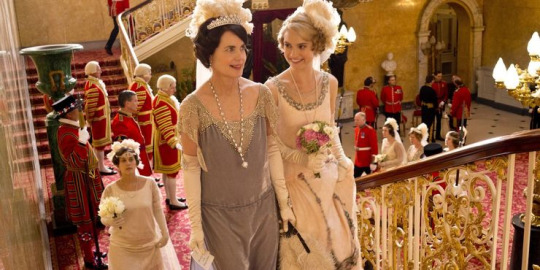
Season 4 of Downton Abbey also takes place over two years, during which the Conservative Party took over government and King George V was still on the throne. This season opens six months after the last episode with Mary and the whole family still grieving Matthew's death. As the 1920s get underway, Lady Rose (Lily James) experiences the socially progressive and more racially integrated jazz scene, and Socialist and anti-aristocratic views become more mainstream. In a special additional episode, Lady Rose is presented at Buckingham palace in the summer of 1923, which is actually the first time the Crawleys meet the royals in Downton Abbey.
Downton Abbey Season 5, 1924
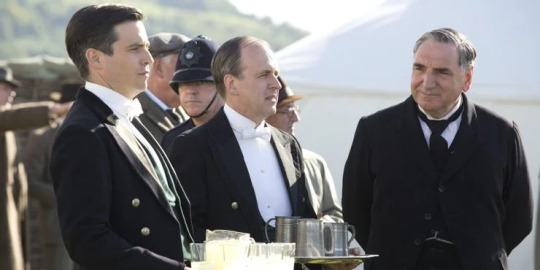
Downton Abbey season 5 covers just the one year of 1924. Politically, this was a time in which the Conservatives and Labour party were jostling for political ground. The Downton estate continues to modernize, as the younger generation (Mary and Tom Branson) clashes with the older generation (Robert Crawley) about the best way forward. The special episode at the end of this season is set during a shooting party in Northumberland in the fall of 1924.
Downton Abbey Season 6, 1925

The final season of Downton Abbey takes place in 1925. Downton is becoming increasingly difficult to run as a private estate, and the threat of bankruptcy looms over the family. The rise of the middle class and growing fluid distinctions between social strata make for a lot of shifts in society. The two-hour Christmas special series finale is set on New Years Eve of 1925.
Downton Abbey Film, 1927
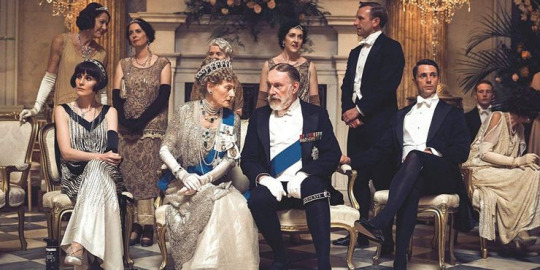
The Downton Abbey feature film, released in cinemas in 2019, picks up where the series left off. The film is set in 1927, during a fictional yet historically-plausible visit by King George V and Queen Mary to Downton. George V was on the throne for the entirety of the Downton Abbey timeline, so it's a fitting end to the TV series. As the film ends, Mr. Carson is convinced that the Crawley family will still be at Downton a hundred years in the future, though with all the social and political changes the 15 years of the series witnessed, they cannot know what is to come. As a sequel, Downton Abbey 2, is set to release on December 22, 2021, audiences will soon have a better idea of the family's future.
#michelle dockery#matthew goode#hugh bonneville#jim carter#downton abbey 2#downton abbey movie#downton abbey#laura carmichael#allen leech#rob james collier#joanne froggatt#lesley nicol#sophie mcshera#kevin doyle
64 notes
·
View notes
Text
Episode 59 - Cumann na mBan During the Irish Civil War
Listen to the last episode of 2023! Learn the vital role Cumann na mBan played in resisting the treaty and assisting the anti-treaty forces.
Join my Patreon
Follow me on Tiktok and Instagram
RSVP to Never Again Chicago’s Legends, Latkes, and Liberation Fundraising Event
Donate to Refugee Community Connection
Free, free…

View On WordPress
#Cumann na mBan#Featured#IRA#Ireland#irish civil war#Irish Republican Army#Irish War of Independence 1919-1921#Irish women#season 3 the irish civil war
0 notes
Photo


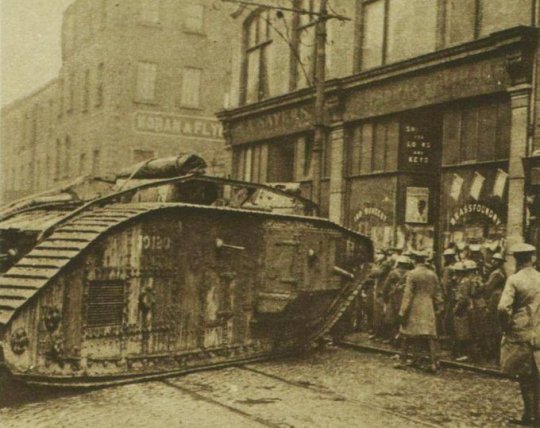
Excelsior #OTD Jan 22 1921 publishes photos of tanks in #Dublin. On right British using a Mark V tank as a battering ram to break down the door of a Johnston Mooney & O'Brien bakery at 153 Capel Street, Dublin, during the Irish War of Independence.
The Mark V Tank was titled Malvern (aka 10120)

1920 - British Army maneuvers a tank across Capel Street near the junction with Mary Street, Dublin - 10623
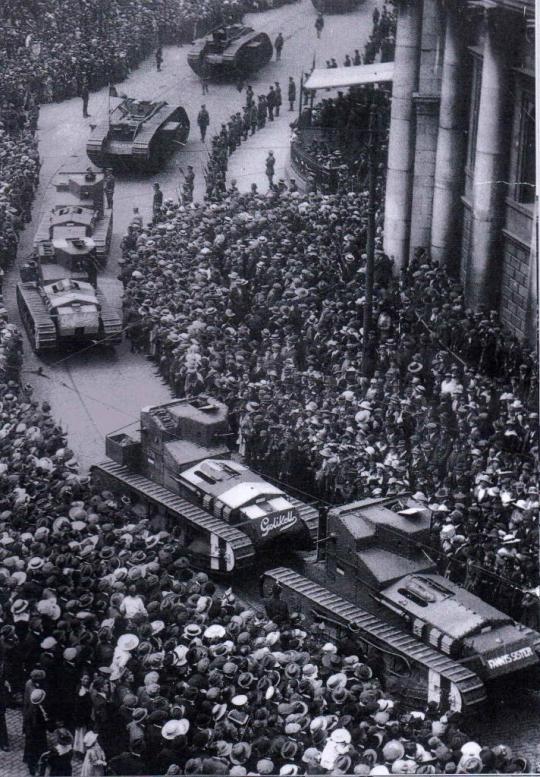
Malvern in the Victory/Peace Parade Jul 19 1919
Picture published in the Freemans Journal Jul 21 1919 and Irish Life, Jul 25 1919.
133 notes
·
View notes
Text
Loves Revolution
Prologue
Pairing: Bradley Bradshaw (as Micheal Collins) x Jake Seresin (as Harry Boland) x OC! Madison Cassidy
Word count: 500words
A/n: This is the first post to my new series so please be nice! I'm going to try to make this into a series so please show this story a bit of love and reblog!
Summary: Bradley, Jake and Maddie have been friends for many years ongoing. Bradley from Cork and Jake and Madison from the troubled Dublin, have been close for life. Now fighting in the 1916 Easter rising and the ongoing history to the Treaty and the independence of Ireland their story lives on.
History:
Bradley (represents) :Michael Collins (October 16, 1890 – August 22, 1922) was an Irish revolutionary, soldier, and politician who was a key role in the early twentieth-century campaign for Irish independence. During the Irish Civil War, he served as Director of Intelligence for the Irish Republican Army (IRA) and as a government minister in the self-proclaimed Irish Republic. From January 1922, he was Chairman of the Provisional Government of the Irish Free State, and from July till his death in an ambush in August 1922, he was Commander-in-Chief of the National Army.
Jake (represents) :Harry Boland (April 27, 1887 – August 1, 1922) was an Irish republican politician who led the Irish Republican Brotherhood from 1919 to 1920. From 1918 until 1922, he was a Teachta Dála (TD).He was elected as the MP for Roscommon South in the 1918 general election, but, like other Sinn Féin candidates, he did not serve in the British House of Commons, instead sitting as a TD in the First Dáil. Boland was elected to the second Dáil as a TD for Mayo South-Roscommon South in the 1921 general election. He was re-elected as an anti-Treaty candidate in 1922, but he perished two months later during the Irish Civil War.
History :The Easter Rising (Irish: Éir Amach na Cásca), often known as the Easter Rebellion, was an armed insurgency in Ireland in April 1916 during Easter Week. While the United Kingdom was waging the First World War, Irish republicans started the Rising against British control in Ireland with the goal of establishing an independent Irish Republic. It was Ireland's greatest important insurrection since the 1798 rebellion and the first armed battle of the Irish revolutionary period. Beginning in May 1916, sixteen of the Rising's leaders were executed. The executions' nature, as well as following political developments, eventually contributed to an upsurge in popular support for Irish independence.
Warning: Mentions of gun use, ptsd, mentions of death, mentions of shooting, flirting, mentions of abuse, description of dead body, death, blood

"Sir, we got the General Post Office surrounded, Sir! We believe that inside are De Valera, Macdonagh, Clark, Connolly and a lot of other rebellions, sir!" One of the funny dressed British soldiers replies to their head commander, with hand at forehead, ready for a salute. This is how the English planned it all along, for the most important rebellions to be stuck at one place, surrounded with no escape.
"So we have the G.P.O, good, very good, but what about O'Connells street, Stevens green, The Liffey and the four courts?" The head commander asked the young man who still held his hand above his head, not moving an inch. "The areas are empty, sir! Either captured or escaped but the rest are at the G.P.O, sir!"
They're all where they were supposed to be, all in one place, no room to escape and they'll give in to this nonsense, they had no way to continue fighting against the British or loyal Irish. The undertakers or loyal Irish were against the rebellions, fighting against them at this very moment, all they had to do now is give themselves up to the English.
"Are there any women inside, lieutenant?" Any innocent woman that had been stuck inside the G.P.O that had been inside the building for the past five days, did not deserve the faith they may face in several minutes from now. The soldiers aligned outside of the building will not hesitate to kill anyone on the inside but the women didn't deserve it.
"There's women of aid and very little volunteers, sir! We believe that one of the fellow female friends of De Valera's help is inside the building. Her parents put her off name Madison Cassidy, but to the public she's known as 'Maddie', sir!" A woman so apparently known to the public but how? No woman that the commander has heard of went by that name or was 'known to the public', no woman has ever had the might or power to be so known in the streets of Dublin or the county of Leinster. "What do you mean 'known to the public', lieutenant?" "She's a public speaker, sir!"
A female public speaker? And that was apparently known to people. Absurd. An absolute absurdity. Some young girl, that he has never heard of decided to become a public speaker. What a joke! She should be scrubbing the dishes, washing the linen, taking care of the kids or cooking and not wasting her time over public speeches. And who would even listen to her? Some sort of female, trying to put her thought into a speech that is apparently supposed to motivate people to do something.
And she believes that's gonna work, but like the lieutenant mentioned, she did work with De Valera. "Bring her to me, nobody lay a finger upon her, understood?" "Yes sir!"
Current taglist:
@callsign-magnolia
@shanimallina87
@callsign-dexter
@rosiahills22
@horseslovers2016
@djs8891
@hookslove1592
@emma8895eb
@hardballoonlove
@kmc1989
@dempy
@mamachasesmayhem
@senawashere
@emma8895eb
@buckysteveloki-me
@sweetwhispersofchaos
@a-beaverhausen
#jake seresin#hangman x reader#hangman top gun#top gun hangman#jake hangman seresin#jake seresin imagine#jake seresin x reader#jake seresin x you#jake seresin x y/n#jake hangman fic#jake hangman x reader#jake hangman x you#jake hangman imagine#hangman imagine
20 notes
·
View notes
Text
#OTD in 1969 – Death of Politician and IRA leader during the War of Independence and Civil War, Dan Breen.
Dan Breen was an iconic IRA figure in both the War of Independence and also the Civil War. Breen was involved in what is accepted as the first action of the War of Independence (1919-1921) when with Sean Treacy and others, he ambushed and killed two RIC (Royal Irish Constabulary) constables James McDonnell and Patrick O’Connell, both of them Catholic and reputedly popular in the community in what…
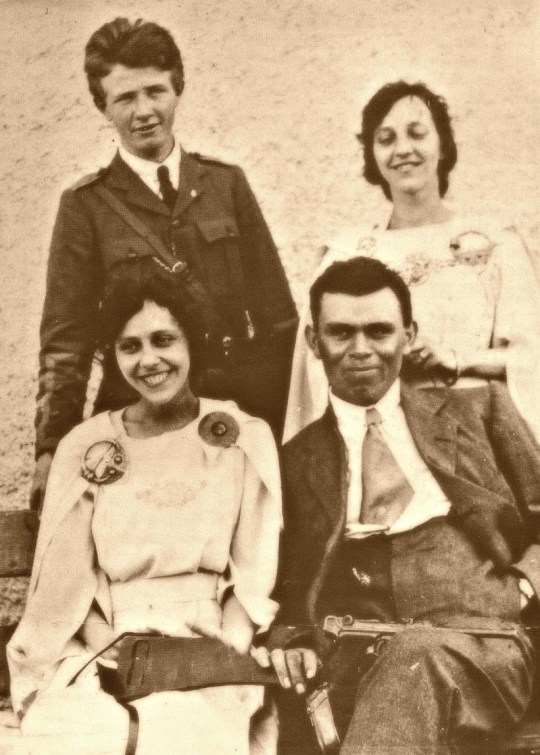
View On WordPress
#anti-Treaty#Brigid Malone#Dan Breen#Dáil Eireann#History#History of Ireland#IRA#Ireland#Irish Civil War#Irish History#Irish War of Independence#Royal Irish Constabulary#Sean Treacy#Sinn Fein#Soloheadbeg Ambush#Tipperary
5 notes
·
View notes
Note
Tell us about your irish middle school history *chin hands*
Well, we don't actually have Middle School. The Irish Education System is broken up into two schools, Primary and Secondary. Primary runs from 4-12 years old and consists of 8 separate year groups. Secondary is broken up into two "cycles", the Junior Certificate cycle and the Leaving Certificate cycle. The Junior Certificate runs for three years, from around 12-14 years old, so it's roughly equivalent to American Middle Schools.
But yeah, in the JC history syllabus, there's a focus on Ireland, but we also learn about history outside of Ireland. The focus is still a bit euro-centric, mostly covering Europe and the United States while I was there, but apparently that's gotten better in recent years: the current syllabus says that the rise of African and Asian nationalism in the 20th Century should also be studied.
The syllabus basically runs in chronological order, starting with ancient Ireland and Ancient Greece/Rome, and running all the way through to the Cold War and the end of the Troubles.
So for the stuff about Ireland, when I was there we covered ancient Ireland, the christianisation of Ireland, Medieval Ireland, the feudal system, the Plantations, the 1798 Rebellion, the Famine, the 1916 Rising and the 1919-1921 War for Independence and the 1922 Civil War, Ireland during WW2 (or as we called it, "The Emergency"), and then the Troubles.
Outside Ireland, there was a bit on Ancient Greece and Rome, the Reformation, the Renaissance, the American War for Independence, the French Revolution, the Agricultural and Industrial Revolutions in Britain, the Inter-War years in Europe, WW2, and then the Cold War.
The 1798 Irish Rebellion is studied alongside and contrasted against the American War for Independence and the French Revolution, drawing parallels and explaining the differences between them.
And yes, we get taught that the major reason behind the War for Independence was the development of a distinct American identity, separate from the British one, due to physical distance and the arrival and integration of non-British colonists.
33 notes
·
View notes